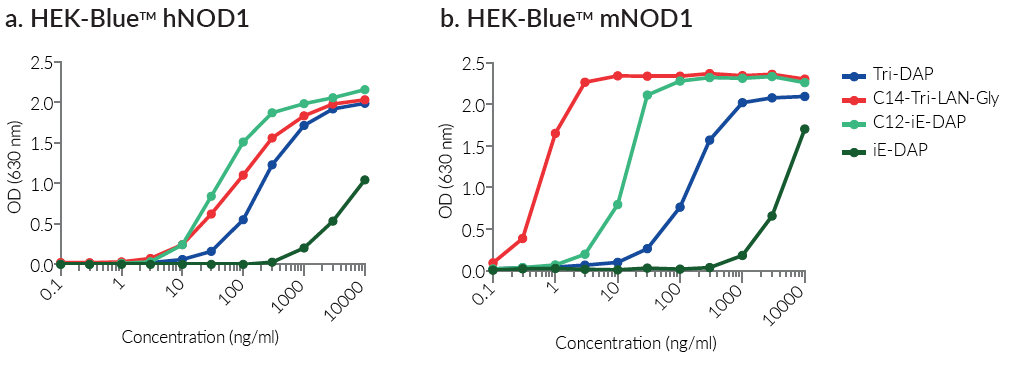C14-Tri-LAN-Gly
| Product | Unit size | Cat. code | Docs. | Qty. | Price | |
|---|---|---|---|---|---|---|
|
C14-Tri-LAN-Gly NOD1 ligand |
Show product |
1 mg |
tlrl-ctlg
|
Discontinued |
Notification: This product has been removed from our catalog and is no longer available. You may also be interested in C12-iE-DAP as an alternative NOD1 ligand.
NOD1 Agonist - Meso‑lanthionine tri-peptide
NOD1 is a pattern recognition receptor that senses Gram‑ bacterial peptidoglycans (PGN), and more specifically the minimal motif γ-glutamyl-meso-diaminopimelic acid (iE-DAP) [1]. Synthetic agonists of NOD1 have been developed in various ways to enhance their potency and intracellular delivery: NOD1 preferentially detects tri-DAP peptides with an N-terminal lipophilic chain [1,2].
InvivoGen has developed C14-Tri-LAN-Gly which contains meso‑lanthionine instead of the meso-DAP moiety, a myristic lipophilic chain, and three peptides (Ala, Glu, Gly) [3]. Meso‑lanthionine is a diamino-type amino acid specific to the PGN of some Gram- bacteria such as Fusobacterium nucleatum [4]. C14-Tri-LAN-Gly has the advantage of being a single diastereoisomer, as opposed to other synthetic NOD1 agonists which are a mixture of L and D isomers.
Recognition of C14-Tri-LAN-Gly by NOD1 induces the activation of the NF-κB signaling pathway. While it activates both human and murine NOD1, it is the agonist of choice for murine NOD1 as it exhibits a ~10-fold better potency than the C12-iE-DAP and a ~100-fold better potency than the Tri-DAP.
References:
1. Girardin SE. et al., 2013. Nod1 detects a unique muropeptide from Gram-negative bacterial peptidoglycan. Science. 300: 1584-87.
2. Nielsen AE. et al., 2017. Synthetic agonists of NOD-like, RIG-like, and C-type lectin receptors for probing the inflammatory immune response. Future Med Chem. (in press).
3. Kingston Mills, Patrick Kelly, Jean-Gerard Tiraby, Thierry Lioux, Eric Perouzel, Patent online 2016, Novel compounds, WO 2016008946 A1
4. Uehara A. et al., 2006. Meso-diaminopimelic acid and meso-lanthionine, amino acids specific to bacterial peptidoglycans, activate human epithelial cells through NOD1. J Immunol. 177(3):1796-804.
Specifications
Specificity: NOD1 agonist
Source: Synthetic
Working concentration: 1 ng - 1 μg/ml
Solubility: 2 mg/ml in water
Synonym: Myristic-Alanine-D-iso-Glutamine-ε-meso-Lanthionine- Glycine
Formula: C30H53N5O10S
CAS: 1863978-69-1
Molecular weight: 675.84
Quality control:
- Purity: ≥95% (UHPLC)
- The biological activity has been validated using HEK‑Blue™ NOD1 cells.
- The absence of bacterial contamination (e.g. lipoproteins and endotoxins) has been confirmed using HEK-Blue™ TLR2 and HEK‑Blue™ TLR4 cells.
Contents
C14-Tri-LAN-Gly is provided lyophilized.
- 1 mg C14-Tri-LAN-Gly
- 1.5 ml sterile endotoxin-free water
![]() C14-Tri-LAN-Gly is shipped at room temperature.
C14-Tri-LAN-Gly is shipped at room temperature.
![]() Upon receipt, store at -20 °C.
Upon receipt, store at -20 °C.
Upon resuspension, prepare aliquots of C14-Tri-LAN-Gly and store at -20 °C.
![]() Resuspended product is stable for 6 months at -20 °C when properly stored.
Resuspended product is stable for 6 months at -20 °C when properly stored.
![]() Avoid repeated freeze-thaw cycles.
Avoid repeated freeze-thaw cycles.






